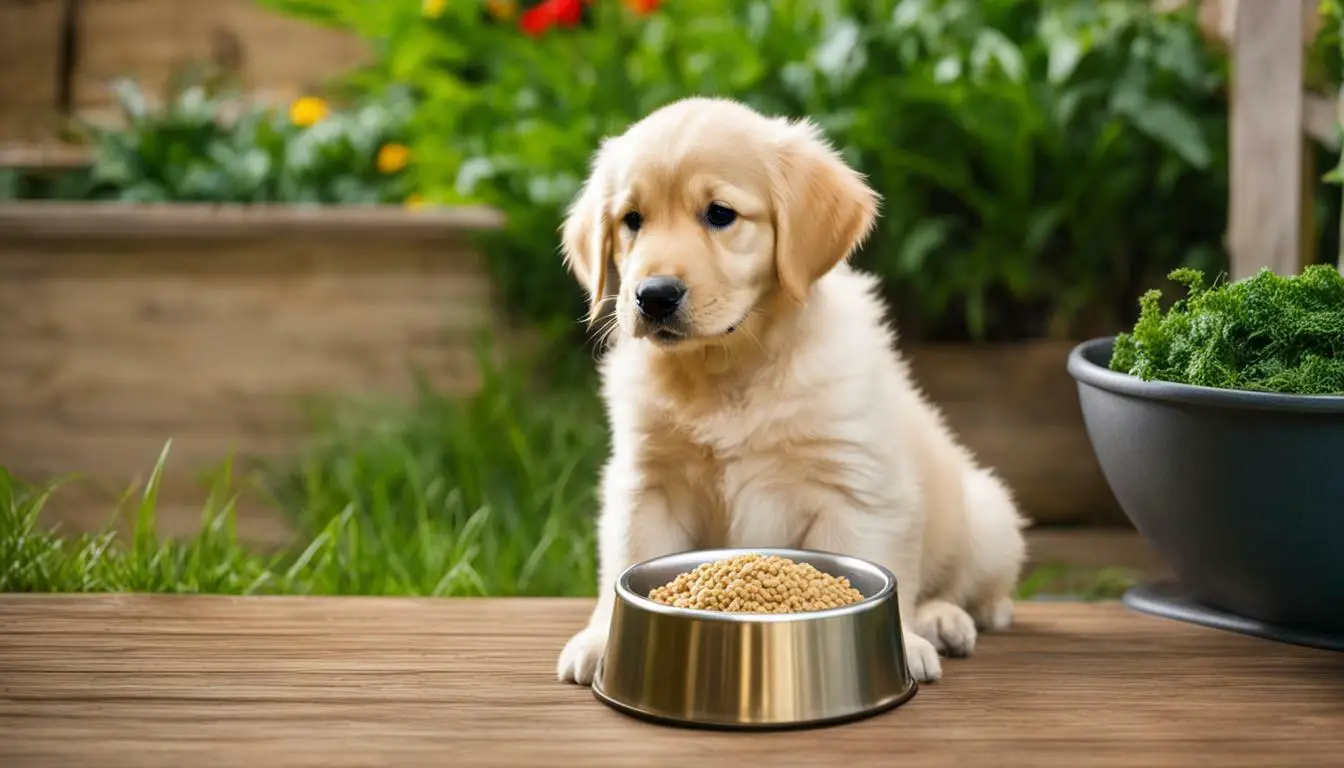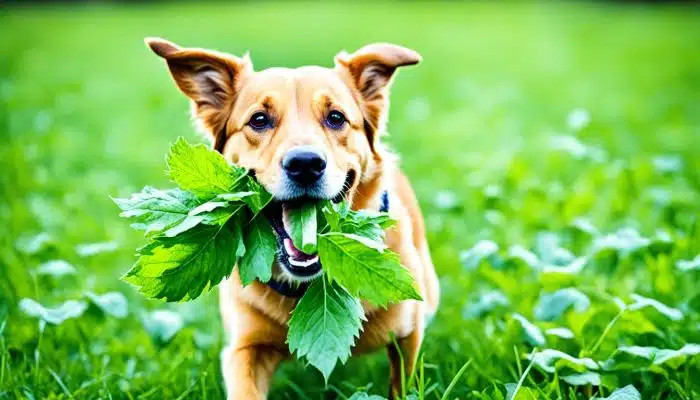As a proud owner of a golden retriever puppy, I understand the importance of giving them the right nutrition for healthy growth and development. It can be overwhelming to decide how much to feed them and what type of food is best for their specific needs. That’s why I’ve put together this guide to provide you with all the necessary information to make informed decisions about your puppy’s diet.
Key Takeaways
- Proper nutrition is crucial for the growth and overall well-being of golden retriever puppies.
- Golden retriever puppies require a balanced diet that includes essential nutrients such as protein, fats, carbohydrates, vitamins, and minerals.
- Establishing a regular feeding schedule and monitoring portion sizes is important for their health.
- Choosing the right food for your golden retriever puppy can have a significant impact on their overall health and development.
- Consult with your veterinarian for personalized guidance based on your puppy’s individual needs.
Understanding Golden Retriever Puppy Nutrition
As a golden retriever puppy owner, it’s essential to understand your furry friend’s nutritional needs. A balanced diet is crucial for their overall health and development.
Golden retriever puppies need a diet rich in essential nutrients, including protein, fats, carbohydrates, vitamins, and minerals. These nutrients support their growth, muscle development, bone health, and immune system. Proper nutrition is also vital in preventing health issues down the road.
When considering your golden retriever puppy’s diet, it’s crucial to establish healthy eating habits. Free-feeding or leaving food out throughout the day can lead to overeating and digestive issues. Instead, puppies require regular meals throughout the day to maintain consistent energy levels.
It’s also essential to monitor the amount of food they consume, as overfeeding can lead to obesity and related health concerns. By providing a balanced diet with appropriate portion sizes, you can ensure your golden retriever puppy receives proper nutrition without overeating.
If you have concerns about your golden retriever puppy’s diet, consulting with a veterinarian can provide personalized guidance on their specific nutritional needs.
Feeding Schedule for Golden Retriever Puppies
Establishing a regular feeding schedule is crucial for a golden retriever puppy’s health and development. Puppies have small stomachs and require frequent feedings to maintain their energy levels.
So, how often should you feed your golden retriever puppy? As a general rule, puppies should be fed three to four times per day until they’re six months old. After that, you can reduce their feedings to two to three times per day.
It’s important to establish a feeding routine that works for you and your puppy. You can choose to feed your puppy at specific times of the day or set up a feeding schedule based on their activity levels. For example, you might feed your puppy before and after exercise or playtime.
| Age of Puppy | Recommended Number of Daily Feedings |
|---|---|
| 6-8 weeks | 4 meals per day |
| 2-3 months | 4 meals per day |
| 4-5 months | 3 meals per day |
| 6-7 months | 2-3 meals per day |
Remember that consistency is key when it comes to your puppy’s feeding schedule. Try to feed them around the same time each day and avoid making sudden changes to their routine. This helps regulate their appetite and digestive system, promoting a healthy metabolism.
Lastly, it’s important to monitor your puppy’s weight and adjust their feeding schedule and portion sizes accordingly. If you notice your puppy is gaining too much weight, you may need to reduce their feedings or adjust their portion sizes. On the other hand, if your puppy is losing weight or appears lethargic, you may need to increase their food intake. Consult with your veterinarian for specific guidance based on your puppy’s individual needs.
Portion Size for Golden Retriever Puppies
As your golden retriever puppy grows, their nutritional needs will change. It’s essential to monitor their portion sizes to ensure they are receiving the appropriate amount of food for their age, weight, and level of activity.
A good guideline is to feed your golden retriever puppy three times a day until they reach six months old. After six months, you can reduce their meals to twice a day. However, always consult with your veterinarian before making any changes to their feeding schedule.
To determine the appropriate portion size for your golden retriever puppy, you’ll need to consider factors such as their age, weight, and activity level. A general rule of thumb is to feed them 1/2 to 1 cup of food per meal, depending on their weight. For example, if your puppy weighs 20 pounds, you can feed them approximately 2 cups of food per day, divided into two or three meals.
However, keep in mind that these are just guidelines, and each puppy is unique. It’s crucial to monitor your puppy’s growth and adjust their portion sizes accordingly. Overfeeding can lead to obesity and other health issues, while underfeeding can stunt their growth and development.
It’s also essential to pay attention to your puppy’s body condition score (BCS), which is a measure of their body fat. A healthy BCS for golden retriever puppies is between 4 and 5 on a scale of 1 to 9. If you notice your puppy is overweight or underweight, consult with your veterinarian to determine the appropriate portion sizes for their specific needs.
Puppy Growth and Nutrition
Golden retriever puppies have specific nutritional needs that are essential for their growth and development. Proper nutrition during the first year of their lives is crucial to ensure they reach their full potential.
During the first few weeks of life, your golden retriever puppy will rely on their mother’s milk for nourishment. After they are weaned, you’ll need to provide them with a balanced diet that includes protein, fats, carbohydrates, vitamins, and minerals. These nutrients are necessary to support their growing muscles, bones, and organs.
As your puppy grows, their nutritional needs will change. It’s important to transition them to adult formula food around 12 months of age. Consult with your veterinarian to determine the best timing for your puppy’s specific needs.
By monitoring your golden retriever puppy’s portion sizes and providing them with a nutritious diet, you can ensure they have a healthy start in life. Remember to consult with your veterinarian for personalized guidance on your puppy’s individual needs.
Selecting the Best Food for Golden Retriever Puppies
Choosing the right food for your golden retriever puppy is an important decision that can impact their overall health and development. With so many options available, it can be overwhelming to determine the best food for your furry friend. Here are some factors to consider when selecting puppy food:
- Ingredients: Look for high-quality ingredients that provide essential nutrients. Choose foods that list meat as the first ingredient, followed by whole grains and vegetables.
- Nutritional needs: Golden retriever puppies have specific nutritional requirements. Look for foods that are designed for puppies and provide the right balance of protein, fats, and carbohydrates for their age and activity level.
- Quality: Choose foods from reputable brands that follow strict quality control standards.
Here are some of the top-rated brands suitable for golden retriever puppies:
| Brand Name | Description |
|---|---|
| Blue Buffalo Life Protection Puppy Food | This brand offers a natural puppy food option that is free from artificial preservatives, colors, or flavors. It contains chicken, brown rice, and sweet potatoes. |
| Purina Pro Plan Puppy Food | This brand offers a complete and balanced puppy food that contains chicken, rice, and barley. It also includes DHA for brain and vision development. |
| Hill’s Science Diet Puppy Food | This brand offers a puppy food option that supports proper brain and eye development. It includes natural ingredients like chicken, barley, and brown rice. |
When introducing a new food to your golden retriever puppy, it’s important to do so gradually by mixing it with their current food. This helps prevent any digestive issues or food aversion. Additionally, consult with your veterinarian for personalized guidance based on your puppy’s individual needs.
Common Feeding Issues and Solutions
Feeding golden retriever puppies can sometimes present challenges, but with patience and the right approach, you can ensure your pup maintains healthy eating habits. Here are some common feeding issues and solutions:
Finicky Eating Habits
Golden retriever puppies can be picky eaters, especially if they aren’t used to their food or are experiencing anxiety or stress. To encourage your puppy to eat, try these tips:
- Stick to a regular feeding schedule and avoid free-feeding.
- Offer small portions of their food throughout the day rather than one large meal.
- Add warm water or low-sodium chicken broth to their food to enhance the aroma and flavor.
Remember to be patient and don’t give up if your puppy doesn’t eat right away. Consistency is key.
Food Allergies
Like humans, dogs can also have food allergies that can cause gastrointestinal problems, skin irritation, and other health issues. If you suspect your golden retriever puppy may have a food allergy, consider switching to a hypoallergenic or limited-ingredient dog food. Consult with your veterinarian to determine the best course of action.
Overfeeding
Golden retrievers are prone to obesity, which can lead to a range of health problems. It’s essential to monitor your puppy’s portion sizes and avoid overfeeding. Here are some tips to prevent overfeeding:
- Calculate the appropriate portion size based on your puppy’s age, weight, and activity level.
- Use a measuring cup to ensure accuracy.
- Avoid giving your puppy table scraps or too many treats. Instead, opt for healthy treat options, such as small amounts of cooked lean meat or fruits and vegetables that are safe for dogs.
Remember, a healthy diet is essential for your puppy’s growth and development. Always consult with your veterinarian if you have any concerns about your golden retriever puppy’s nutrition or eating habits.
Conclusion
In conclusion, as a professional copywriting journalist, I highly recommend paying close attention to your golden retriever puppy’s nutrition to ensure their growth and health. By understanding their dietary needs, establishing a regular feeding schedule, monitoring portion sizes, and selecting high-quality food, you can help your puppy grow into a happy and healthy adult.
Remember, every puppy is unique, and consulting with your veterinarian is always recommended to develop a personalized feeding plan. Additionally, it’s important to keep an eye out for any signs of feeding issues, such as finicky eating habits or food allergies, and address them promptly.
As a dog lover, I wish you and your golden retriever puppy all the best on your journey together. With proper nutrition and care, your furry friend will be by your side for many years to come.
FAQ
How much should I feed my golden retriever puppy?
The amount of food your golden retriever puppy needs will depend on their age, weight, and activity level. It is generally recommended to follow the feeding guidelines provided by the specific brand of puppy food you are using. However, as a general rule, you can start with three to four small meals a day, gradually reducing it to three meals by the time they are six months old. Always consult with your veterinarian for personalized guidance.
What should I feed my golden retriever puppy?
Golden retriever puppies require a diet that is specifically formulated for their nutritional needs. Look for high-quality puppy food that contains a balance of protein, fats, carbohydrates, vitamins, and minerals. Avoid foods with artificial additives or fillers. Your veterinarian can provide recommendations based on your puppy’s individual needs.
How often should I feed my golden retriever puppy?
It is recommended to feed your golden retriever puppy three to four small meals a day until they are six months old. After that, you can reduce it to three meals. Establishing a regular feeding schedule is important to maintain consistency and help with potty training. Avoid free-feeding, where food is available at all times, as it can lead to overeating and weight gain.
How do I determine the portion size for my golden retriever puppy?
Portion sizes for golden retriever puppies vary based on their age, weight, and activity level. As a general guideline, you can calculate the portion size using the recommended feeding guidelines provided by the puppy food brand. However, it is important to monitor your puppy’s growth and adjust the portion size accordingly. Consult with your veterinarian for personalized guidance.
What should I consider when selecting puppy food for my golden retriever?
When selecting puppy food for your golden retriever, consider the ingredients, quality, and specific nutritional needs. Look for a food that lists a high-quality source of animal protein as the first ingredient. Avoid foods that contain artificial additives, fillers, or excessive amounts of grains. It is also important to choose a food that is appropriate for your puppy’s age and size. Your veterinarian can provide recommendations based on your puppy’s individual needs.
My golden retriever puppy is a picky eater. What should I do?
Some golden retriever puppies may be picky eaters, but it’s important to establish healthy eating habits. Ensure you are providing a high-quality, balanced diet and avoid feeding table scraps or excessive treats. If your puppy consistently refuses to eat, consult with your veterinarian to rule out any underlying health issues. They may recommend a different food or suggest strategies to entice your puppy to eat.
Can I give treats to my golden retriever puppy?
Yes, treats can be given to golden retriever puppies as part of their diet. However, it’s important to choose healthy treats that are specifically formulated for puppies. Avoid treats that are high in fat, sugar, or artificial additives. Treats should be given in moderation and not make up a significant portion of their daily caloric intake. Consult with your veterinarian for recommendations on suitable treats.





